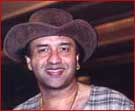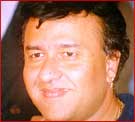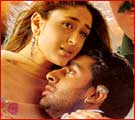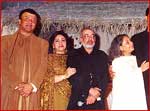'I am a natural'
 For obvious reasons Anu Malik is on a terrific high.
For obvious reasons Anu Malik is on a terrific high.
He has been finally vindicated from accusations of being a copycat and a fluke in the industry.
The National Award for Best Music
(Refugee) is a slap on the face of his detractors, he says candidly.
It was a long journey for the son of veteran Sardar Malik, who began with the obscure
Hunterwali 77 in 1978. He achieved his first tryst with fame with Ek Jaan Hain Hum (1983), Sohni Mahiwal (1984) and Mard (1985).
By the beginning of the 90s, Anu Malik had burnt out his creative batteries with prolific cacophony and wrong career moves.
The brief era of Nadeem-Shravan-Anand-Milind-Raamlaxman spelt doom for Malik. But the steadfast support of his wife Anju, the faith of a handful of loyalists like Venus, the Mehras of Eagle Films and Mahesh Bhatt and a numerologist's help (one 'N' was removed from his name) helped keep Anu's penchant for hard work and his motivation to strike back going at full gear.
In 1993, Anu staged musicbiz's most incredible comeback with
Sir, Phir Teri Kahani Yaad Aayi and Baazigar. Since then, Anu's been on a roller coaster, getting embroiled in controversies, and being repeatedly ridiculed by detractors and rivals.
In these eight years, his faith, self-confidence, hard work and determination kept Nadeem-Shravan, A R Rehman and Jatin Lalit at bay.
He also proved that no tunesmith of the post-Laxmikant Pyarelal-R D Burman-Kalyanji Anandji generation has had his kind of versatility, by providing scores like
Imtihaan, Vijaypath, Akele Hum Akele Tum, Border, Virasat, Tamanna, Ishq, Judwaa, Duplicate, Jaanam Samjha Karo, Kareeb, Baadshah, Fiza, Josh, Refugee and Rahul.
Dr Rajiv Vijayakar met the Malik of music at Sahara Recording Centre, as he rehearsed with Shubha Mudgal for a raag-based song for Rajkumar Santoshi's Lajja. 'Others inform me which raag my song should be based on. I am a natural composer with a God-given gift for composing. In any creative field, you either have it, or you don't!'
 Excerpts from an interview:
Excerpts from an interview:
'And the National Award for Best Music goes to Anu Malik for Refugee.' What was your first reaction to this?
Well, my wife was watching television, and catching up with the National Award controversy over the Best Actor and Actress Awards.
Casually she listened to the names of the other awardees and was stunned to hear my name. She immediately called me up on my cell phone. 'Anu, you have won the National Award!' she said, stunning me in turn.
It took me sometime for the news to sink in. I tried to calm myself, but a whole kaleidoscope of emotions went surging through me.
Then I was flooded with congratulatory calls. Javedsaab was the first to call up, followed by Lata Mangeshkar, who called from Pune to say that I deserved the award! That was like getting another award in itself!
Kareena Kapoor and Alka Yagnik were the next and then many others called. It was an unforgettable moment.
Did other composers call up to congratulate you?
Coming to think of it, not one composer called!
What else did you feel apart from the initial ecstasy?
I felt very grateful to J P Dutta who had faith in me from the beginning.
There was never an indecision about the tunes of Refugee. I would hum Aisa lagtaa hain or Panchhi nadiyan and after one sentence, Duttasaab would tell me, "Anu, that's it!"
I also felt very thankful to Javedsaab who even told me that my tunes had superceded his lyrics. Also to Sonu Nigam, Udit Narayan, Sukhwindara Singh, Shanker Mahadevan and Alka Yagnik in particular.
This award is God's answer to those who dismissed my success with various excuses. It's divine justice. I missed out popular and National Awards for Border and Virasat. Then I won after being nominated for two films at the National Awards - Fiza and Refugee.
But Fiza was shared with two guest composers. Aren't you glad you won for Refugee?
Frankly, all the songs from Fiza that made news were mine. Ranjit Barot who composed Mere watan, which wasn't a song in the strictest sense, works often with me as a programmer.
I am happy that I won for Refugee because it was not the popular kind of score, but had strong melody and Indianness. I really worked hard on it. In fact, I think that that is my career's finest score till date.
Apart from Baazigar seven years ago, awards eluded you. Has your thirst is quenched now or has the craving increased?
I feel that things have come full circle.
Anyone who says that awards make no difference to him is lying through his teeth!
I agree that popularity is an award by itself but this kind of recognition of your hard work is so inspiring and thrilling. I have enjoyed every moment of this high!
This year, Filmfare gave me a Special Jury award for obvious reasons even though their Best Music award went to another composer.

I appreciate this, because in 1993, they had given me my Baazigar award on the same criterion against Khalnayak.
At the same time, I feel a tremendous sense of responsibility now. I cannot sit back and think that I am the best. I have to prove again and again that I am the most original music director around, even if I'm everyone's favourite whipping boy.
I owe my success to the Almighty.
The general consensus is that your music suffered because of low-key marketing and tame picturisation.
The film's music was traditional and thus lacked instant appeal.
I think that the music company did not give the time needed for the music to grow on the public, and sidelined it when it did not get an instant response.
But I do not agree about the picturisation. The songs were beautifully picturised and enacted.
Do you feel that in this line, it is important to feel insecure, otherwise you cannot sustain?
Absolutely! It is this insecurity, which keeps you going. This is a positive insecurity, as one can never predict when a colleague suddenly makes an impact and affects your own standing.
How has your approach to work and music changed after this award?
I used to feel sidelined and betrayed before.
In terms of actual commercial gains, an award does not count anywhere in a hit-powered industry - it only makes a personal difference.
But the equations do change. I feel like experimenting more and more with singers, lyricists and my music.
I have now to work for myself. Today is the age when music can be downloaded from the net. Why should anyone buy music unless it's straight from the heart and original?
Do you want to learn more now that expectations have risen?
Look, I am a natural composer, though I did learn all the important thaats from my father. I think this is the best way, because otherwise I may end up being rigid.
What I would like to learn now is the technology. I can now dream of composing and collaborating with international musicians.
At one stage, even the popular awards seemed impossible. Then Baazigar happened.
Then I felt that the National Award was beyond my reach. Now there's no reason why I cannot win the Grammy! My country has honored me in 2001. I can now set my sights on honouring my country in return with my future work.
 Finally, what do you have to say about the lack of real competition in the film music scene?
Finally, what do you have to say about the lack of real competition in the film music scene?
I don't quite appreciate that statement.
At one level, it implies that I am surviving because of a lack of competition and not because of my work or talent. At another it implies that I am way ahead of the others only because I have films with the maximum number of big filmmakers.
I am a leader, not a follower. I want to compete with my own scores.
I get great satisfaction when my filmmakers come back to me, and I find great pleasure in satisfying such a wide range of filmmakers as Sooraj Barjatya, Subhash Ghai, who consistently lauds my music in Yaadein, which I personally consider my career-best score, David Dhawan, Mahesh Manjrekar, Mansoor Khan, Abbas-Mustan, Meghna Gulzar and others.
At the same time, I realise with a sense of humility that if the film industry wasn't there, I wouldn't have been there too!